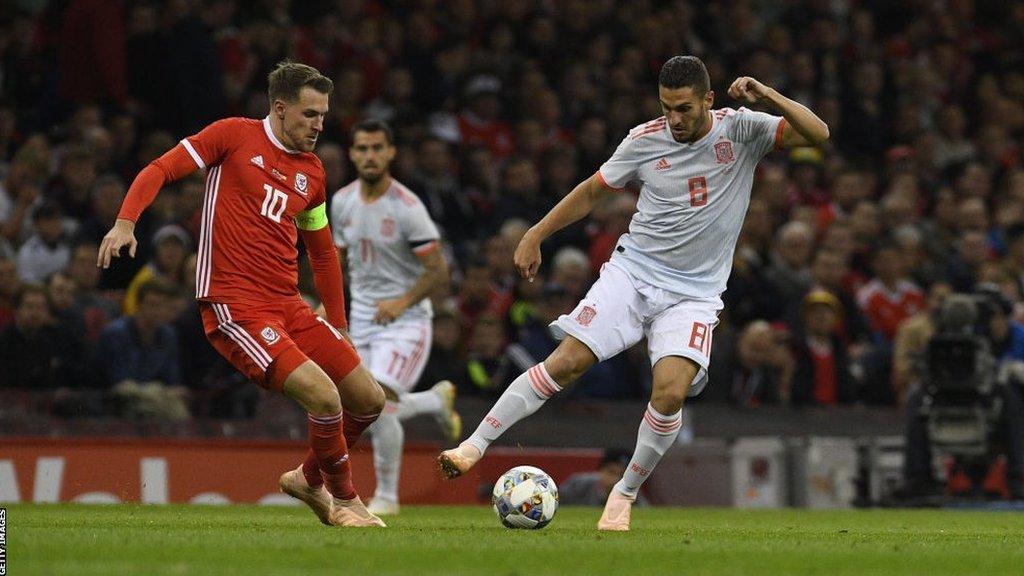Euro 2028: What co-hosts Wales can expect with venues, qualification and more
- Published

The Principality Stadium, opened in 1999 as the Millennium Stadium, is the home of Welsh rugby
Wales have been named as co-hosts of a major international football tournament for the first time as Euro 2028 co-hosts.
In less than five years' time, the biggest football fixtures since the 2017 Champions League final will be coming to Cardiff as part of the UK and Ireland bid which will also see games played in England, Scotland, the Republic of Ireland and Northern Ireland.
But how many games can Wales expect and what does it mean for qualification?
Here BBC Sport Wales outlines all you need to know about the bid.
What is the background?
Wales' limited stadiums meant that hosting a major finals had been something of a pipe dream for many years.
There had been an early declaration of interest in co-hosting Euro 2020 as part of a joint 'Celtic' bid with Scotland and the Republic of Ireland, before the decision to stage that year's finals across Europe.
Wales had prepared a detailed bid to be one of the host cities for that event, but missed out on the final vote in 2014.
Four years later, the Football Association of Wales' (FAW) then chief executive Jonathan Ford admitted there had been talks over a home nations bid for the 2030 World Cup.
With the Republic of Ireland also coming on board, a feasibility study was held before a decision was taken to instead aim for the European Championship in 2028, with a formal bid entered in April this year.
When did we know the bid was successful?
Uefa made the official announcement on Tuesday at its executive committee meeting in Nyon, Switzerland.
Ordinarily, there might have been some mystery with a vote to decide following the formal and final bid presentations.
But with Turkey pulling out of the race to focus on a joint bid with Italy for Euro 2032, there was only one candidate to stage the 24-team tournament.
How many games will be in Wales?

Wales' most recent football match at the Principality Stadium was a friendly against Spain in 2018
We do not know for certain and it could be some time before we do.
Cardiff's Principality Stadium is one of 10 venues across nine cities and five countries presented by bid teams.
Other venues include Wembley, the Tottenham Hotspur Stadium, the Etihad, St James' Park, Villa Park and the soon-to-be-built Everton stadium in England, Hampden Park in Glasgow, the Aviva Stadium in Dublin and the proposed redeveloped Casement Park in Belfast.
Wembley is expected to host the final - and probably the semi-finals - but nothing has been decided formally.
Those talks will take place when an organising committee - which is likely to contain representatives from all five nations - is set up to guide the decision, but Uefa would have the final say.
Still, the size of the Principality Stadium - which will be called the National Stadium of Wales for the tournament - does suggest there would be significant games beyond the group stage held in Cardiff.
The Principality Stadium currently boasts the second-largest capacity of the venues involved.
It is thought the hope would be for Cardiff to stage at least three group games, a last-16 tie and a quarter-final.
It is known the FAW has pushed for the opening game, but that could depend on whether Wales qualify. While final decisions on the tournament format rest with Uefa, and are yet to be confirmed, it is understood that the bid is proposing that the Principality Stadium stages the opening match.
Will Wales qualify as hosts?
That is another decision which is yet to be made.
In its bid guidelines, Uefa says: "In case of more than two joint-host associations, the automatic qualification of all the host teams cannot be guaranteed and shall be subject to a decision to be made in conjunction with decisions concerning the qualifying competition."
It is unlikely Uefa will offer more than two places, so three could miss out.
There has been some talk of all five nations trying to qualify with two 'backstop' qualification spots available for those who miss out, with either the highest-ranking nations who failed to qualify going through, or the two sides that come closest to qualifying.
However, it has been said that there are some reservations within Uefa about offering a 'backdoor' entry to sides who have failed to qualify, as well as its potential impact on the normal qualifying process.
It seems that this will be a topic high on the agenda once the green light is formally given to the UK and Ireland to stage Euro 2028, as Welsh football's dream comes close to being realised.